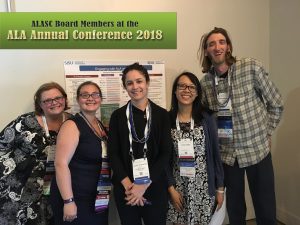 One evening in 2010, in a small family-oriented library where I work as a part-time Reference Librarian, I found myself faced with a dilemma. A parent came to me for assistance. She quietly stepped up to the reference desk, and so as not to be overheard, whispered that a man seated next to her 9-year-old child was using one of the public access computers to browse what looked like child pornography. I was facing one of my biggest fears: confronting someone for accessing pornography, possibly violating his Library Bill of Rights and contradicting intellectual freedom – or was I? I was the only librarian on duty. I had to think, assess the situation, confirm the information and act quickly, discreetly, and ethically to solve this dilemma. What should I do? What would you do? What library principles should librarians and library professionals obey in a similar situation?
One evening in 2010, in a small family-oriented library where I work as a part-time Reference Librarian, I found myself faced with a dilemma. A parent came to me for assistance. She quietly stepped up to the reference desk, and so as not to be overheard, whispered that a man seated next to her 9-year-old child was using one of the public access computers to browse what looked like child pornography. I was facing one of my biggest fears: confronting someone for accessing pornography, possibly violating his Library Bill of Rights and contradicting intellectual freedom – or was I? I was the only librarian on duty. I had to think, assess the situation, confirm the information and act quickly, discreetly, and ethically to solve this dilemma. What should I do? What would you do? What library principles should librarians and library professionals obey in a similar situation?
I am certain that I am not the first – and sadly not the last – librarian to encounter a similar situation. First of all, without corroborating the alleged claim, I must admit that my reaction was not only judgmental; it was also unprofessional. Thus, I am writing about my predicament because, I know that as a SLIS graduate student at San José State University, I must remember to apply the concepts in Competency A “Articulate the ethics, values and foundational principles of library and information professionals and their role in the promotion of intellectual freedom.” (Statement, 2010) and this dilemma is a prime example.
Resources and Tools
Librarianship has multiple resources that provide librarians and library professionals the guidelines and tools we need to deal with and resolve an ethical dilemma. The most authoritative resource librarians have to deal with these matters is the American Library Association (ALA) and its Office for Intellectual Freedom. It provides us with policies, guidelines, and training, whenever needed. Its mission is to implement the ALA policies applicable to intellectual freedom. The best tool available to promote intellectual freedom at the library is presented in the Library Bill of Rights, and its precepts are based on the First Amendment to the U.S. Constitution. Since I did not know the law as it pertains to accessing child pornography in computers at the public library, the situation described above created an ethical dilemma because it not only conflicted with my personal values and beliefs, it conflicted with the ALA’s Code of Ethics, and the Library Bill of Rights, which guarantee intellectual freedom for everyone, at the library.
Another respected and reliable resource for librarians in California is the California Library Association (CLA), which has an Intellectual Freedom Working Committee whose mission is to “create awareness of the issues of intellectual freedom, investigates any controversial issue, provides resources for handling problems and prepares recommendations.” (About, 2010) I became a CLA student member in 2007. Among the benefits of membership the CLA offers its members a subscription to the California Library Information eXchange known as the CALIX listserv and it is available to all CLA members who become subscribers. I have received the CALIX e-mails for a couple of years and most queries focus on library issues and trends, and its intent is to be a forum for librarians in California to practice intellectual freedom and exchange information freely.
CALIX Forum
I did not see the need to use the CALIX listserv until well after the incident described above. I know that I did not handle the situation well, and it disturbed me. I told the woman that if I could not confirm the allegation of child pornography, the user was within his Library Bill of Rights to access and view pornography at the library. Of course, she was not satisfied with my response, because it would deny protections for her and her child.
Months later, after much deliberation on my own, I realized I was trying to resolve an ethical dilemma by myself and I was troubled by my lack of knowledge and understanding on how I could have handled it better, and how I will handle it in the future. It took me a while to realize that I needed help. Now, I know I should not have made CALIX my last resort; I should have made it my first choice to get advice. After all, the members of CALIX are mostly library staff and librarians that compared to me have years of experience in public, academic, school and special libraries. I wanted to learn from others what I could have done better; what applicable laws and guidelines were there to help me. I sent a CALIX message and I learned different perspectives and policies from public, academic, and special librarians. I learned that Librarians are definitely a great resource.
What I Learned in CALIX
Federal Law specifically Title18 of the U.S. Code – Section §2256 and the California Penal Code – Section §311-312.7 Chapter 7.5 prohibit the sexual exploitation of children and the distribution of obscene materials involving a minors, respectively. Thus, child pornography is illegal and it is a federal offense punishable with imprisonment.
There are great differences in public, academic, school and special library policies to regulate the access of adult pornography in public access computers. The major difference is made according to whether or not a library is receiving federal funding, thus, the library is required to filter all access to questionable sites.
There are options and solutions to uphold the precepts of intellectual freedom when using public access computers at the library. Libraries that are self-reliant such as research, private and some academic libraries may be more liberal in permitting access to all information online, including adult pornography as long as there are no minors present. Libraries that are accountable for federal funding usually filter all public access with the option to provide privacy shields or remove filters as requested by library users, with the utmost regard to preventing children from inadvertently viewing these sites.
I received excellent suggestions for Library Programs and Training that can be implemented in most libraries to ensure librarians and library staff upholds the precepts of the ALA’s Library Bill of Rights and the Code of Ethics, while at the same time ensuring the intellectual freedom of all library users.
A librarian’s duty includes protecting everyone’s right to intellectual freedom. In the situation above, I faced an ethical dilemma that will be encountered by most librarians or library staff at some point in their careers. My only means to seek justice and truth was to inform the authorities and to tell the patron he had to leave. It was very hard for me to talk to the patron, not only because of the nature of the situation, but also because I thought I was violating his Library Bill of Rights. I have learned the laws regarding this issue and I recognize that I acted accordingly and professionally. I thank the CLA, CALIX and its members, for allowing me to share my learning process. Now, I pass it forward to you, to learn along with me.
Yolanda Ramirez works as a part time Reference Librarian and is currently focusing her classes in the reference and instruction track. She plans to graduate in December 2010.

